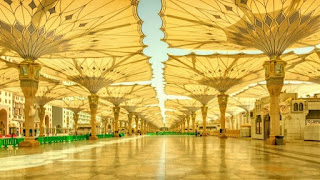The Masjid al-Haram and the Masjid al-Nabawi are two holy mosques that serve as the primary destinations for Muslims embarking on the Hajj pilgrimage or Umrah. In these two mosques, Muslims can experience the serenity and beauty of worship in the holy land.
However, there are several things that pilgrims or Umrah performers must be mindful of and adhere to while in these two mosques. The Saudi Arabian government has issued certain prohibitions aimed at maintaining order, security, and cleanliness in these two mosques.
6 Prohibitions in Masjid al-Haram and Masjid al-Nabawi
If pilgrims violate these prohibitions, they may face sanctions ranging from warnings, fines, to detention by local security forces.
Certainly, such violations would disrupt the smoothness and tranquility of the worship for the pilgrims. Therefore, it is crucial for the pilgrims to be aware of and abide by these prohibitions to ensure the success and blessings of their worship.
1. Capturing Videos or Photos with Prolonged Duration and Static Shots
One of the prohibitions that pilgrims must avoid is capturing videos or photos with prolonged duration and static shots inside or around the two mosques. This can disturb other worshippers or those engaged in prayers. It becomes even more disruptive if using equipment such as tripods, microphones, or additional lighting.
Additionally, such actions may raise suspicion from Saudi security personnel who closely monitor the two mosques through hundreds of CCTV cameras installed at various locations.
Actually, capturing videos or photos within these mosques is not entirely prohibited, as long as it is done with proper etiquette. For example, one should avoid diverting the attention of other worshippers, refrain from capturing images of others without their permission, and avoid stopping or causing a crowd while taking pictures or videos. Therefore, if one wishes to capture precious moments in these two mosques, they should do so quickly, simply, and without disturbing others.
2. Displaying Banners, Flags, or Signs that Indicate Specific Identities or Groups
Another prohibition that pilgrims must avoid is displaying banners, flags, or signs indicating specific identities or groups while inside or outside the two mosques. This can create an impression of exclusivity or differentiation among the worshippers.
Even displaying one's own country's flag is not permitted by the Saudi government. If one wishes to showcase a specific identity or group, it is advisable to do so in a more modest and inconspicuous manner. For instance, one can use pins, stickers, clothing, bags, or other accessories that are not overly large or conspicuous. If carrying banners, flags, or signs representing Indonesia or a particular travel agency, it is best to keep them at the accommodation or in the vehicle and not bring them into the two mosques.
3. Taking Found Items in Public Areas
Another prohibition that pilgrims must avoid is taking found items in public areas within or around the two mosques. This could be perceived as theft or deception by Saudi security personnel. Even though the intention may be to safeguard the lost item, such actions can have severe consequences for the pilgrims involved.
If one finds valuable items scattered or misplaced in public areas, it is advisable to immediately report them to the nearest officer or staff member in the two mosques. These officials will secure the item and search for its rightful owner. By doing so, pilgrims need not worry about being accused of theft or deception.
4. Gathering in Groups Larger Than 5 People
Another prohibition that pilgrims must avoid is gathering in groups larger than five people while inside or around the two mosques. This can impede the movement of other worshippers who wish to engage in prayer or worship. Furthermore, it may raise suspicions from Saudi security personnel who may perceive something suspicious about the group.
If pilgrims want to meet with fellow worshippers, it is advisable to do so in less crowded or busy areas. Alternatively, if the meeting must take place inside the two mosques, it should involve a limited number of people and should not last for an extended period. It is important to maintain distance and adhere to health protocols when interacting with other worshippers.
5. Speaking Loudly or Engaging in Debates
Another prohibition that pilgrims must avoid is speaking loudly or engaging in debates while inside the two mosques. This can disrupt the concentration and serenity of other worshippers who are engaged in prayer or worship. Additionally, it can lead to misunderstandings or conflicts among worshippers.
If one wishes to speak with fellow worshippers, it is best to do so in a soft and respectful tone. Avoid using harsh language, making offensive remarks, or mocking others. If there are differences of opinion or issues with other worshippers, it is advisable to resolve them in a peaceful manner without escalating tensions.
6. Improper Disposal of Trash
The final prohibition that pilgrims must avoid is improper disposal of trash while inside or around the two mosques. This can pollute the environment and tarnish the beauty of these holy places. Moreover, it demonstrates a lack of concern and respect for the sacredness of the Islamic landmarks.
Islam teaches its followers to maintain cleanliness wherever they go, especially when in these two holy mosques. The Saudi government is stringent in ensuring the cleanliness of the areas surrounding the two mosques. To support this cause, numerous trash bins are provided throughout the vicinity. Therefore, if pilgrims need to dispose of trash, they should look for the nearest trash bin and dispose of it accordingly.
In conclusion, these are the six prohibitions that pilgrims must be aware of and adhere to when inside Masjid al-Haram and Masjid al-Nabawi. By understanding and respecting these prohibitions, pilgrims can perform their worship smoothly, comfortably, and with blessings. May this article be beneficial, and may you have a blessed worship experience!














0 Comments